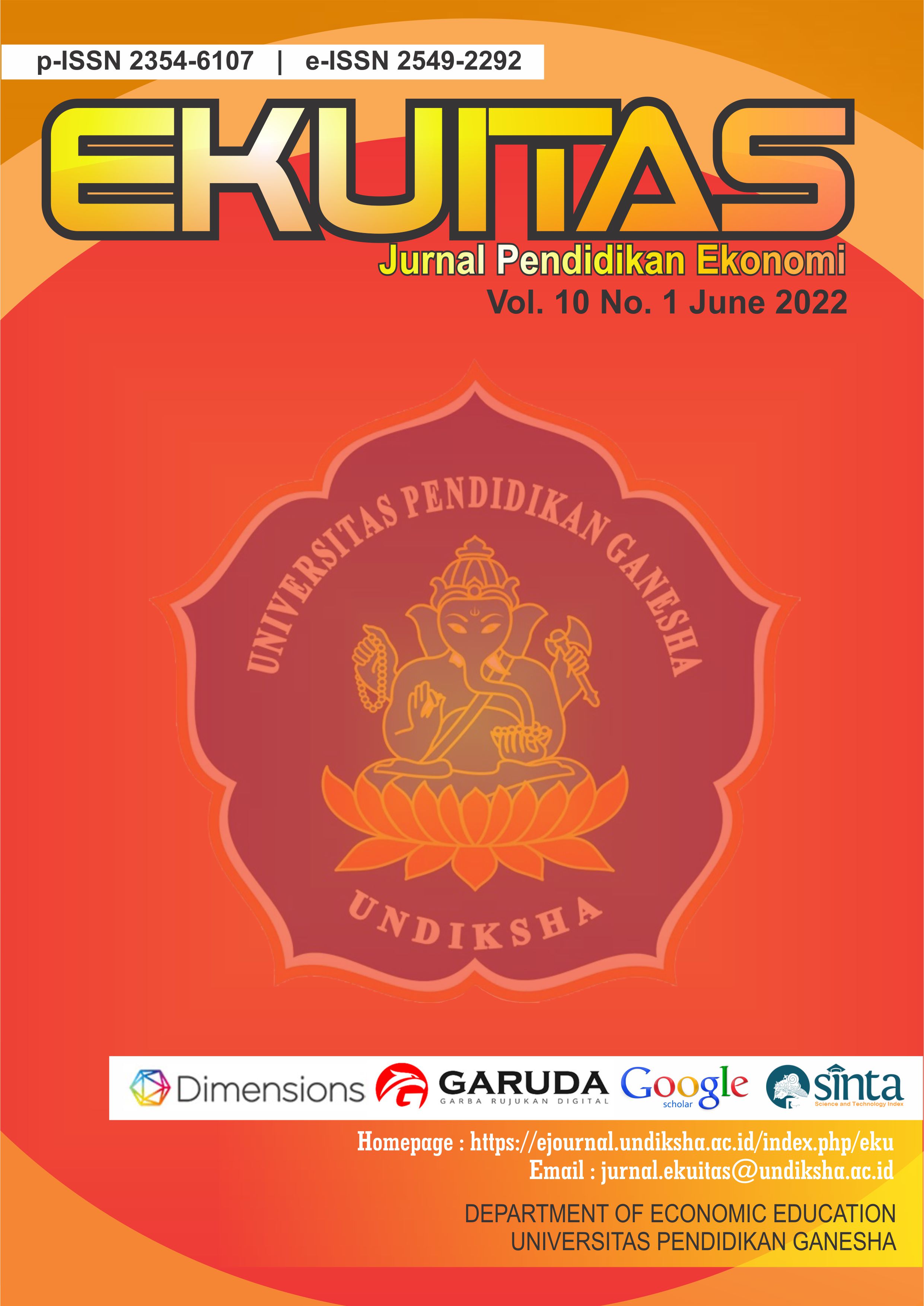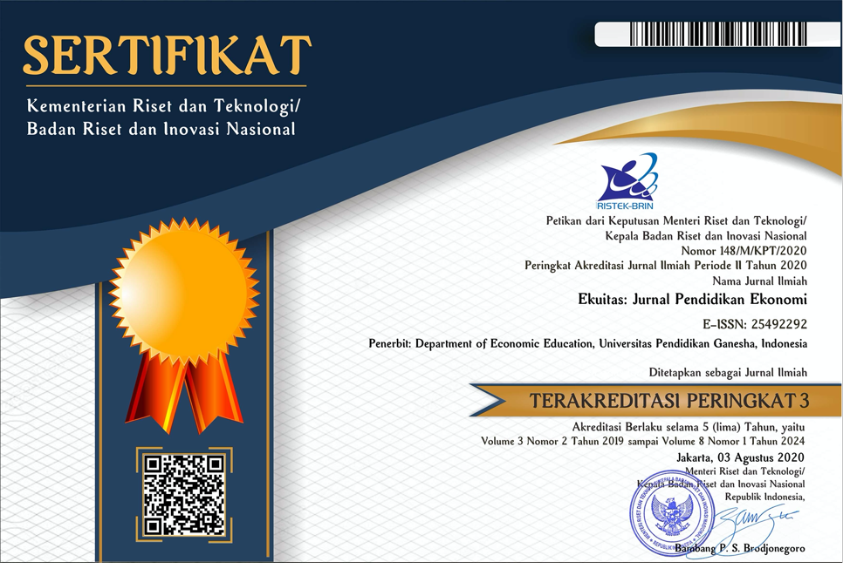Perilaku Konsumen Muslim di Lombok Berdasarkan Religiusitas dan Gaya Hidup
DOI:
https://doi.org/10.23887/ekuitas.v10i1.42783Keywords:
Consumer behavior, lifestyle, muslim, religiosityAbstract
This paper is the result of research that aims to identify and analyze whether religiosity and lifestyle partially or simultaneously contribute to the influence of Muslim consumer attitudes in Lombok. The research results were processed by SPSS 20.0 testing. and the results both partially and simultaneously affect the behavior of Muslim consumers. And of the two variables, the more significant contribution to Muslim consumer behavior is the religiosity factor. It was found that at the level of religiosity most of the respondents stated their agreement on the elements that make up the dimensions of aqidah, shari'ah, religious knowledge, appreciation, and practice dimensions. This means that the consumer's decision to buy a product is in accordance with the content of their faith. Religious activities do not only occur when a person carries out rituals, but also when carrying out other activities such as buying and selling methods, consuming etc. For lifestyle variables, 78% of respondents reported their agreement on the main factors that make lifestyles, namely demographic factors such as education, age and total income that affect a person's lifestyle. Meanwhile, on psychographic factors, 91% of respondents agreed that psychographic factors such as interests, interests, hobbies and opinions affect a person's lifestyle. In this study, the determining variables in consumption activities are the consumption foundation and the consumption principle.
References
Agarwala, R., Mishra, P., & Singh, R. (2019). Religiosity and consumer behavior: a summarizing review. Journal of Management, Spirituality and Religion, 16(1), 32–54. https://doi.org/10.1080/14766086.2018.1495098
Devi, A., Nugraha, H. S., & Dewi, R. S. (2015). Pengaruh Citra Merek, Harga dan Gaya Hidup Terhadap Keputusan Pembelian Produk Imitasi. Jurnal Ilmu Administrasi Bisnis, 4(1), 85–94.
Djamaludin Ancok; Sungaidi Ardani, M. F. N. S. (2000). Psikologi Islami : solusi Islam atas problem-problem psikologi (3rd ed.). Yogyakarta : Pustaka Pelajar.
Essoo, N., & Dibb, S. (2010). Religious Influences on Shopping Behaviour: An Exploratory Study. Http://Dx.Doi.Org/10.1362/0267257041838728, 20(7–8), 683–712. https://doi.org/10.1362/0267257041838728
Fraenkel, J. R., Wallen, N. E., & Hyun, H. H. (2012). How to desIgn and evaluate research In educatIon (8th ed.). New York: Mc Graw HIll. e (8th ed.). New York: Mc Graw HIll.
Hurriyati, R. (2019). Bauran Pemasaran dan Loyalitas Konsumen: Fokus pada Konsumen Kartu Kredit Perbankan (2nd ed.). Bandung: Alfabeta.
Jogiyanto, H. . (2004). Metodologi penelitian bisnis : salah kaprah dan pengalaman-pengalaman. In Yogyakarta: BPFE.
Jusmaliani, J., & Nasution, H. (2013). Religiosity Aspect in Consumer Behaviour: Determinants of Halal Meat Consumption. ASEAN Marketing Journal, 1(1). https://doi.org/10.21002/AMJ.V1I1.1977
Kotler, P. (2006). Manajemen Pemasaran, Edisi Terj.Benyamin Molan. (Edisi Kese). Jakarta: Indeks.
Kurt, D., Inman, J. J., & Gino, F. (2018). Religious shoppers spend less money. Journal of Experimental Social Psychology, 78, 116–124. https://doi.org/10.1016/J.JESP.2018.03.019
Latim Miatun, S., Santoso, L., & Korespondensi, E. (2020). Pengaruh Religiusitas Terhadap Gaya Hidup Konsumen Muslim Di Ponorogo. SERAMBI: Jurnal Ekonomi Manajemen Dan Bisnis Islam, 2(2), 113–120. https://doi.org/10.36407/SERAMBI.V2I2.181
Ma’zumi, M., Taswiyah, T., & Najmudin, N. (2017). Pengaruh Religiusitas Terhadap Perilaku Ekonomi Masyarakat Pasar tradisional (Studi Empiris pada masyarakat Pasar Tradisional di kota Serang Provinsi Banten). Al Qalam, 34(2), 313–336. https://doi.org/10.32678/ALQALAM.V34I2.791
Mowen, J. C. & M. M. (2002). Perilaku Konsumen. Jakarta: PT. Gelora Aksara Pratama.
Muflih, M. (2006). Perilaku konsumen dalam perspektif ilmu ekonomi islam. In Jakarta : RajaGrafindo Persada,.
Nashori, F. N., Mucharam, R. D., & Ru’iya, S. (2002). Mengembangkan kreativitas dalam perspektif psikologi Islam. Menara Kudus.
Nugroho,priyo, Anton; Hidayat, Anas; Kusuma, H. (2017). The Influence of Religiosity and Self-Efficacy on the Saving Behavior of the Islamic Banks. Banks and Bank Systems, 12(3), 35–47.
Puteri, H. E., & Zuwardi, Z. (2019). Orientasi Budaya dan Religiusitas Dalam Manajemen Kredit Serta Dampaknya Terhadap Kinerja Sosial Bank Perkreditan Rakyat. Jurnal Benefita, 4(1), 196–209. https://doi.org/10.22216/JBE.V1I1.3895
Putri Savitri, A. (2017). Pengaruh norma subyektif, religiusitas dan self control terhadap perilaku konsumtif masyarakat muslimah pengguna kartu kredit - Digilib UIN Sunan Ampel Surabaya. UIN Sunan Ampel Surabaya.
Rahmadi, I., & Prasetyo, A. (2015). Pengaruh Gaya Hidup Konsumen Muslim Terhadap Adopsi Smartphone Apple (Studi Pada Mahasiswa Fakultas Ekonomi dan Bisnis Universitas Airlangga). Jurnal Ekonomi Syariah Teori Dan Terapan, 2(3), 196–203. https://doi.org/10.20473/VOL2ISS20153PP196-203
Rahmat, Arif; Asyari, Asyari; Puteri, Eka, H. (2020). Pengaruh Hedonisme dan Religiusitas Terhadap Perilaku Konsumtif Mahasiswa. Ekonomika Syariah: Journal of Economic Studies, 4(1), 39–55. https://doi.org/http://dx.doi.org/10.30983/es.v4i1.3198
Ruslan, R. (2017). Metode Penelitian, Public Relations Dan Komunikasi (p. 312). p. 312. Jakarta: PT. RAJAGRAFINDO PERSADA.
Sutisna. (2002). Perilaku Konsumen dan Komunikasi Pemasaran. Bandung: Rosda.
Downloads
Published
How to Cite
Issue
Section
License
Copyright (c) 2022 Ekuitas: Jurnal Pendidikan Ekonomi

This work is licensed under a Creative Commons Attribution-ShareAlike 4.0 International License.








